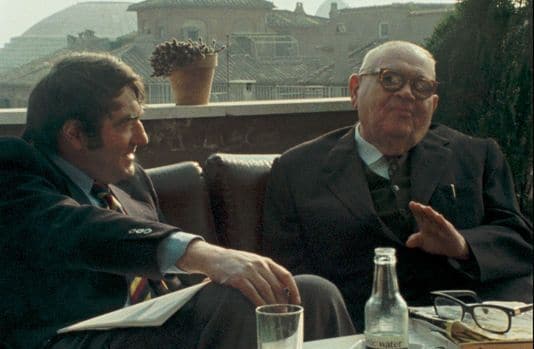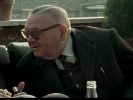Eye For Film >> Movies >> The Last Of The Unjust (2013) Film Review
The Last Of The Unjust
Reviewed by: Anne-Katrin Titze

"Who in the world knows the name Bohušovice?" are the first words spoken in Claude Lanzmann's scrupulous unveiling of Benjamin Murmelstein in The Last Of The Unjust (Le Dernier Des Injustes). The 'ageless' Lanzmann in the present stands on the platform of a small town in the Czech Republic, the place of disembarkation to the Nazi's “model city” of Theresienstadt. The past is present from the very first moments, after a text on the screen gives a broad, yet focused overview of important historical facts. "We cannot control the traffic," says Lanzmann, our guide, who tells and reads to us about the past we can sense still trapped in the decaying buildings, the peeling paint, the overgrown paths of this town of unspeakable horrors that functioned so well as a lie to the world.
Freight trains of the present roll by while he reads on camera from Murmelstein's 1961 book Terezin, Il Ghetto Modello Di Eichmann about Theresienstadt, the place to "ease the conscience", advertised as a thermal spa and idyllic spot for the elderly. Lanzmann starts off with the different modes of transport, the cargo trains and the wealthy Jews from Hamburg who come in 2nd class and whose illusions are shattered upon arrival. He reads to us the apocalyptic visions of the past while we see a train pull into the station today. You do the rest. You do your share in the work of memory and imagination.

Any documentary filmmaker tempted to reconstruct a past with costumes and music as a means to bring it closer to an audience should watch how Lanzmann does without through expert storytelling. He offers text and images, he offers a conscience and a push to look into ourselves. He holds on to a trolley in the crematorium in a white shirt and it is this simple touch of the metal, while he speaks about the use of hearses to transport food for the living, that makes the "living ghosts" in a "world upside down" come alive on the screen at that moment.
The interviews Lanzmann conducted with Benjamin Murmelstein in Rome in 1975 resemble a chess match between two grandmasters. Murmelstein, an impressive presence, who sizes up Lanzmann just as much as the other way around, is introduced to us comparing Judaism to an eroded forest, missing in the whole world and causing "climatic repercussions." Mythology is his field, says the last appointed head of the Jewish Council of Theresienstadt, and ties the interview to Orpheus and Eurydice - "sometimes looking back is not good." "It could be dangerous?" Lanzmann asks and knows that Murmelstein, who considers the film a "belated epilogue," had not yet "testified", not even at the Eichmann trial in Jerusalem. The two men had a unique relationship ever since Murmelstein, a rabbi in Vienna, taught Adolf Eichmann in the annexed Austria of 1938 all about "emigration."
Lanzmann whose film mainly moves between the two spheres of the Rome interviews and the present day locations, the atrocities in between the real of the buildings and the voices conjured to be heard, also includes footage from the Nazi propaganda film The Führer Gives A City To The Jews (1944). Children happily eating slices of bread with what looks like a lot of butter (in 1944!), a soccer match, a lecture and workers leaving the barracks after a normal day of work - this was the image the Nazis tried to project to the world. And Murmelstein became Scheherazade, the storyteller from the Thousand And One Nights: "I survived because I had to tell a fairy tale." About the paradise of Theresienstadt. The fairy tale changed on May 5, 1945 to Little Red Riding Hood, when the grandmotherly disguise fell off the wolf.
Murmelstein's vivid comparisons show us an educated, clever man, who clearly had thought about his legacy. When he evokes the ancient custom of a slave becoming king for a day, to be mercilessly degraded and mocked, which he traces from the Orient to Rome to the Rhine's carnivalesque celebrations, he sees himself as a tragic-comic figure. Not a "marionette" or a "tool" that he was accused of being, if so "the marionette had to pull his own strings."
Lanzmann's interview leads back to Murmelstein's early administrative work for the Jewish community as part of the Cultural Council in Vienna in 1938 where he first encountered Eichmann, who at that time did not even have his own office and, according to Murmelstein, actively took part in the destruction of a synagogue on the night of November 9th to the 10th 1938, the so-called Reichskristallnacht.
Murmelstein very clearly states how "laughable" he finds Hannah Arendt's conclusions about Eichmann's "banality", and gives us a picture of a "corrupt Eichmann," a "demon", who played bureaucratic, hellish games with desperate people for his own profit. With his accomplice, a Mr. Schlie who established the Hanseatic Travel Agency, they tested how fast people would get rid of their belongings and money for what turned out to be a never held promise of escape.
The Last Of The Unjust digs deep into infernal regions that link present concerns to past horrors - certificates of paid gas and electricity bills, fees for owning a dog and horrendous emigration taxes were all methods to raise unfounded hopes, keep busy, and provide a false sense of agency.
"A member of the Jewish Council is like a dinosaur on a motorway,” Murmelstein says to Lanzmann as the two men stroll along the remnants of a Rome past.
The film with all its large time leaps gives the impression not of something alien, long dead, but very pertinent to the now.
Murmelstein speaks about his "thirst for adventure," and Lanzmann calls him out on it. He follows up on "taste for power", too, as Murmelstein defends it as a long way from "abuse of power."
Besides an unmatched glimpse into the mind of the only surviving Jewish Elder of a Nazi ghetto, Lanzmann traces the veiled steps to the "Final Solution" from Madagascar to Nisko to Theresienstadt to Auschwitz. Violence and falsehood, the East standing for "indeterminacy", camouflage tactics and how one name becomes code and mask for another - Murmelstein explains his own role in the mirage invented by the Nazis of "Jews deporting themselves." Starting out as the head of the technical and health departments he dealt with a typhus epidemic partly by using the Nazis' own methods. "The Elder of the Jews was always between the hammer and the anvil, the Jews and the Germans,” he says.
In the present, Lanzmann stands on the grounds of the past in Theresienstadt, so comfortingly close to Prague, in the "heart of Bohemia", and gives us the details of the story of the deaths of Murmelstein's two predecessors, Jakob Edelstein the former head of the Jewish Community of Prague and Paul Eppstein, who was the speaker of the central organisation of Jews in Nazi Germany.
Sancho Panza is how Murmelstein sees himself, the "calculating realist" who, while others were fighting the windmills, helped in the "embellishment" of Theresienstadt to keep it and him alive as a showpiece.
You can feel time standing still. Lanzmann takes "a sinister place of unforgettable beauty", pushes us to see the swindle, "the town as if" and the machinations of forgetting.
When I asked Claude Lanzmann during the 51st New York Film Festival at Alice Tully Hall about the challenge of re-visiting the footage after almost 40 years, he said: "When I saw the rushes, I decided that I was the only one able to do it, or do it in such a way that I don't betray him and that I don't betray me. It was very difficult. The trick was, I needed quite a lot of courage in one way to be myself in the film. I act in the film in two ages of my life. When I am young, I am 50 - now I have no age whatsoever. And I can prove it to you!"
With The Last Of The Unjust, Claude Lanzmann opens up a new important chapter to magnificently complement his boundary-changing documentary Shoah from 1985.
Reviewed on: 05 Jan 2014















